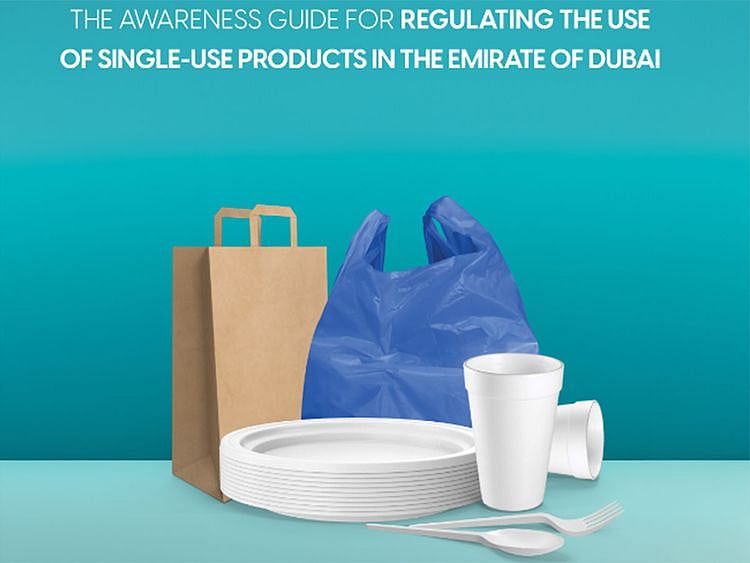Dubai explains total ban on different single-use products in 3 phases
Check which products face comprehensive ban on June 1, 2024, Jan 1, 2025 and Jan 1, 2026

Dubai: Dubai Municipality on Thursday explained total ban on different types of single-use products in three phases.
The additional guidance for businesses and consumers on regulating the use of single-use products comes after the single-use plastic ban that was issued in January following a resolution by Sheikh Hamdan bin Mohammed bin Rashid Al Maktoum, Crown Prince of Dubai and Chairman of Dubai’s Executive Council.
The resolution was introduced to protect the environment by minimising plastic waste through changing consumer habits and fostering a culture of recycling among businesses and the community. Dubai Municipality published the awareness guide for the initiative under its #DubaiMoreSustainable campaign, which was launched at COP28. The guide has now been expanded with more information and an FAQ to help people and businesses adhere to the new rules.
Also Read
Single use plastic bags and products banned from January 1, 2024 in DubaiWatch: Meet the British expat driving sustainability awareness in the UAEPlastic bags ban: Abu Dhabi records 95 per cent drop in use of single use plastic bags in one yearUAE: Ban on single-use plastic bags takes effect in AjmanNew dates
As per the new awareness guide, Dubai will stop levying 25 fils on single-use plastic bags and impose a total ban on all single-use bags from June 1, 2024.
From January 1, 2025, plastic stirrers, Styrofoam food containers, plastic table covers, plastic cotton swabs, plastic straws, single-use Styrofoam cups will be banned.
January 1, 2026 will see a ban on single-use plastic cups and lids, single-use plastic cutlery, plastic food containers, plastic plates.
Violators will be subject to a fine of Dh200. If the same violation occurs within one year, the penalty will be doubled, with a maximum of Dh2,000.
Plastic ban explained
Does the ban include all single-use bags?
Beginning June 1, 2024, the comprehensive ban on single-use bags will include all types of bags that are 57 micrometres thick or less. The types of bags that are banned include plastic bags, paper bags, bags made from biodegradable plant materials, and biodegradable bags.
What is the issue with biodegradable bags?
Biodegradable bags require their own recycling stations. If left in landfills, they leave behind small plastic particles (microplastics) which can be consumed by animals and in this way enter the food chain.
What bags are exempt from the ban policy?
Bread bags, trash bin liners, wrapping bags for vegetables, meats, fish, and chicken, bags thicker than 57 micrometres, laundry bags, electronic device bags, various garbage bags, grain bags, bags used for products bought online.
What are the alternatives to bags?
Reusable bags that can be used for an extended period.
How to report stores not complying with the 25 fils fee?
Through the consumer protection channels in the Dubai Department of Economy and Tourism via the ‘Dubai Consumer’ app, the website for consumer rights or the contact centre 600545555.
Sustainable practices
The municipality said the new guidelines are aimed at individuals, public sector entities, private businesses, corporations, and institutions, promoting everyday sustainable practices at work and at home in line with its efforts to advance quality of life and sustainability.
“The move not only helps safeguard the environment but also supports the development of a circular economy, sustainable development, and the preservation of natural resources for future generations,” it stated.
Mohammed Alrayees, head of Waste Strategy and Projects Department at Dubai Municipality, said: “Dubai Municipality is committed to transforming Dubai into a leading and sustainable global city. This comprehensive guide has been launched to answer questions on single-use plastics and green alternatives in line with our support for all individuals, businesses and institutions to adopt sustainable practices.”
The guide, available online in Arabic and English, answers important questions that consumers and businesses may have about the ban. It also highlights green alternatives to plastics along with tips on how to be more sustainable.
The guide can be downloaded from the municipality’s website.
Sign up for the Daily Briefing
Get the latest news and updates straight to your inbox
Network Links
GN StoreDownload our app
© Al Nisr Publishing LLC 2026. All rights reserved.